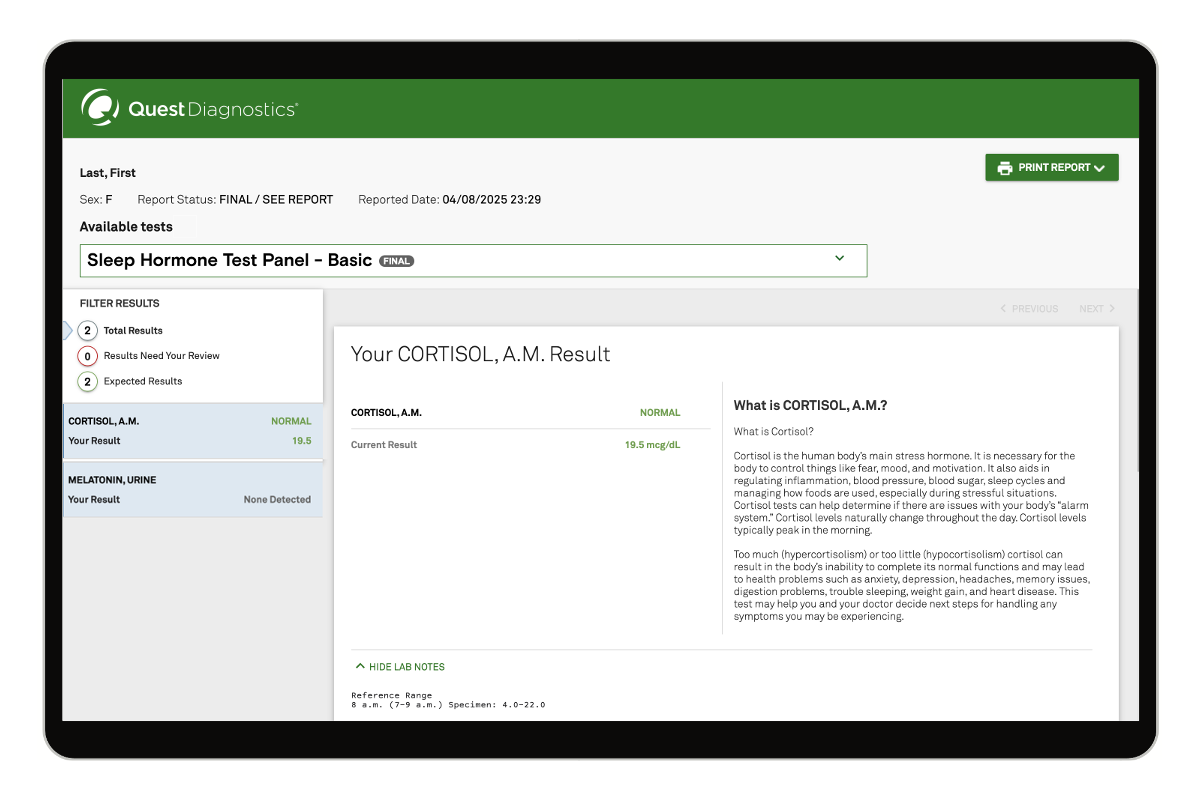Sleep Hormone Test Panel — Basic
This test checks the morning levels of two hormones present in your body, cortisol and melatonin. For this test, cortisol is collected via a blood draw and melatonin is collected via a urine sample. Both hormones play an important role in a person’s quality of sleep. Measuring the levels of these hormones can help you and your healthcare provider understand why you may be having problems sleeping. Read moreThis test checks the morning levels of two hormones present in your body, cortisol and melatonin. For this test, cortisol is collected via a blood draw and melatonin is collected via a urine sample. Melatonin and cortisol have an opposite relationship and work together to regulate sleep and wake cycles. Cortisol levels are typically highest in the morning and tend to decrease throughout the day. At night, cortisol levels continue to decrease, while levels of melatonin, the body’s major sleep hormone, start to rise in response to darkness, preparing the body to sleep.
Buy your own sleep hormone test online with Quest. No doctor’s visit needed – simply purchase, access hormone testing at a nearby location, and get fast results.
How it works
questhealth.com offers 100+ consumer-initiated Quest Diagnostics lab tests to empower you to have more control over your health journey. Choose from a variety of test types that best suit your needs.
- Center for Disease Control. About Sleep. Accessed March 12, 2025. https://www.cdc.gov/sleep/about/index.html.
- Quest Diagnostics. Cortisol, A.M. Accessed August 10, 2023. https://testdirectory.questdiagnostics.com/test/test-detail/4212/cortisol-am?p=r&q=4212&cc=PHP.
- WebMD. What is Cortisol?. Accessed August 10, 2023. https://www.webmd.com/a-to-z-guides/what-is-cortisol
- Cleveland Clinic. Cortisol. Accessed August 10, 2023. https://my.clevelandclinic.org/health/articles/22187-cortisol
- Cleveland Clinic. Melatonin. Accessed March 12, 2025. https://my.clevelandclinic.org/health/articles/23411-melatonin
- Cleveland Clinic. Sleep Disorders. Accessed March 12, 2025. https://my.clevelandclinic.org/health/diseases/11429-sleep-disorders
- St. Hilaire, M.A., Lockley, S.W. (2022). Measuring Urinary 6-Sulphatoxymelatonin in Humans. In: Jockers, R., Cecon, E. (eds) Melatonin. Methods in Molecular Biology, vol 2550. Humana, New York, NY. https://doi.org/10.1007/978-1-0716-2593-4_4


